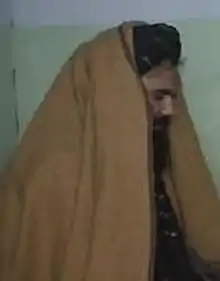Sirajuddin Haqqani
Sirajuddin Haqqani (Arabic: سراج الدين حقاني aliases Khalifa, and, Siraj Haqqani. born c. 1973 to 1980[2][3]) is a military leader hailing from Afghanistan, who, as deputy leader of the Taliban, had previously overseen armed combat against American and coalition forces, reportedly from a base within North Waziristan in Pakistan. Sirajuddin Haqqani is the leader of the Haqqani network, a sub-set of the Taliban organisation, and scion of the Haqqani clan.[4][5][6][7] Haqqani is currently deputy leader under the Taliban supreme commander, Mawlawi Haibatullah Akhundzada.[8][9][1] However, it was later acknowledged on 7 May 2020 that late Taliban founder Mohammad Omar's son Mullah Mohammad Yaqoob had become head of the Taliban military commission, thus making him the insurgents' new military chief.[10]
Sirajuddin Haqqani سراج الدين حقاني | |
|---|---|
 Video still of Sirajuddin Haqqani during an interview | |
| Born | c. 1973 to 1980 Afghanistan or Pakistan |
| Allegiance | |
| Years of service | 2000s to present |
| Rank | Deputy leader of the Taliban[1] |
| Battles/wars | War on Terror Civil war in Afghanistan (1996–2001) War in Afghanistan (2001–present) Taliban insurgency Operation Zarb-e-Azb |
| Relations | Jalaluddin Haqqani (father) |
Name
Sirajuddin and Siraj
The Arabic of the English translation, Sirajuddin, is سراج الدين. According to one source, which provides the translation within Urdu, the name has the meaning light of the religion.[11] The name Siraj, converted to Arabic, is سِرَاج, which similarly has the meaning of any object which produces light, or light itself, i.e. a cresset, lamp, a candle, or again, light itself, and accordingly, the Sun. Siraj is a Quranic name, in that it is used four times within the Quran, and the word is also used to describe Prophet Mohammad.[12]
Haqqani
The Arabic conversion of Haqqani is حقانی, which means something or someone, just, fair-minded or impartial.[13]
Early life
He spent his childhood in Miramshah, North Waziristan, and attended Darul Uloom Haqqania near Peshawar, Khyber Pakhtunkhwa.
Family life
Sirajuddin Haqqani is the son of Jalaluddin Haqqani, a well-known mujahideen and military leader of pro-Taliban forces in Afghanistan and Pakistan. His younger brother Mohammad Haqqani, also a member of the network, died in a drone attack on February 18, 2010. The attack was conducted in Dande Darpakhel, a village in North Waziristan.[14]
Activities
Serena Hotel
Haqqani has admitted planning the January 14, 2008 attack against the Serena Hotel in Kabul that killed six people, including American citizen Thor David Hesla.[15]
Assassination attempt
Haqqani confessed his organization and direction of the planning of an attempt to assassinate Hamid Karzai, planned for April 2008.[5][15]
Elementary school
His forces have been accused by coalition forces of carrying out the late-December 2008 bombing in Kabul, Afghanistan at an Afghan barracks near an Afghan elementary school that killed several schoolchildren, an Afghan soldier, and an Afghan guard; no coalition personnel were affected.
Journalist hostage
In November 2008 New York Times reporter David S. Rohde was kidnapped in Afghanistan. His initial captors are believed to have been solely interested in a ransom. Sirajuddin Haqqani is reported to have been Rohde's last captor prior to his escape.[16]
Drones
Several reports indicated that Haqqani was targeted in a massive U.S. drone attack on February 2, 2010,[17] but that he was not present in the area affected by the attack.[18]
In March 2010, Haqqani was described as one of the leaders on the "Taliban's Quetta Shura".[19]
Sirajuddin Haqqani's deputy, Sangeen Zadran, was killed by a US drone strike on 5 September 2013.[20]
Communications
A communication was posted, on the occasion of the election of Mullah A.M. Mansoor as the new leader of the Taliban, quoting Sirajuddin Haqqani:[21]
...My particular recommendation to all members of the Islamic Emirate is to maintain their internal unity and discipline...
Reward for capture
The U.S. government's Rewards for Justice Program is offering up to US$10 million in reward for information leading to Sirajuddin Haqqani's capture.[15]
Reported coronavirus infection
On May 31, 2020, British Taliban expert Antonio Guistozzi told Foreign Policy that Sirajuddin Haqqani was infected with COVID-19.[22] This infection also resulted in Sirajuddin being absent from the group's leadership mix.[22]
Writings
In 2010 he released a 144-page Pashto-language book, a training manual entitled Military Lessons for the Benefit of the Mujahedeen, where he appears more radical than the Talibans as it shows influences from al-Qaida, supporting beheading and suicide bombings while legitimizing targeting the West, asking Muslims there to "blend in, shave, wear Western dress, be patient."[23]
References
- "Mullah Omar: Taliban choose deputy Mansour as successor". BBC News. 31 July 2015. Retrieved 31 July 2015.
- "Sirajuddin Haqqani".
- "Wanted: Sirajuddun Haqqani". Rewards for Justice. Retrieved 2014-08-21.
- Islamabad Boys, The New Republic, 27 January 2010
- The National Counter-Terrorism Centre. Profile. published by The National Counter-Terrorism Centre. Retrieved 2015-11-10.
- E. Hayes (Retired Army Intelligence Officer) - article published August 23, 2015 by Counter Terrorism Lectures and Consulting [Retrieved 2015-11-10]
- S. Mehsud. report. published October 23rd, 2015 by the Combating Terrorism Centre of Westpoint. Retrieved 2015-11-10.(please see West Point)
- Janes https://web.archive.org/web/20070228153854/http://www.janes.com/defence/news/jdi/jdi061128_1_n.shtml. Archived from the original on 28 February 2007. Retrieved 22 May 2016. Missing or empty
|title=(help)CS1 maint: bot: original URL status unknown (link) - "Afghan Taliban announce successor to Mullah Mansour". BBC News. 25 May 2016. Retrieved 25 May 2016.
- Ben Farmer (7 May 2020), "Taliban founder's son appointed military chief of insurgents", The Telegraph. Retrieved 7 June 2020.
- One Pakistan - site published by Onepakistan.com 2012 [Retrieved 2015-11-10]
- site published by quranicnames.com, &, One Pakistan - site published by Onepakistan.com 2012 [Retrieved 2015-11-10]
- One Pakistan - site published by Onepakistan.com 2012 [Retrieved 2015-11-10]
- Shah, Pir Zubair (2010-02-19). "Missile Kills Militant Commander's Brother in Pakistan". The New York Times. Retrieved 2010-02-19.
- "Wanted: Sirajuddun Haqqani". Rewards for Justice. Archived from the original on 2009-08-22. Retrieved 2010-12-04.
- Matthew Cole (2009-06-22). "The David Rohde Puzzle". New York. Retrieved 2009-07-01.
- Shahzad, Syed Saleem (2010-02-05). "US fires off new warning in Pakistan". Asia Times Online. Retrieved 2010-02-04.
- "Sources: Drone strikes kill 29 in Pakistan". CNN. 2010-02-02. Retrieved 2010-02-02.
- Amir Mir (2010-03-01). "Pakistan wipes out half of Quetta Shura". The News International. Archived from the original on 2010-03-04.
The remaining nine members of the Quetta Shura who are still at large are believed to be Mullah Hassan Rehmani, the former governor of Kandahar province in Taliban regime; Hafiz Abdul Majeed, the former chief of the Afghan Intelligence and the surge commander of the Taliban in southern Afghanistan; Amir Khan Muttaqi, a former minister in Taliban regime; Agha Jan Mutasim, the Taliban’s head of political affairs; Mullah Abdul Jalil, the head of the Taliban’s shadowy interior ministry, Sirajuddin Haqqani, the son of Maulvi Jalaluddin Haqqani and the commander of the Haqqani militant network; Mullah Abdul Latif Mansoor, the commander of the Mansoor network in Paktika and Khost; Mullah Abdur Razaq Akhundzada, the former corps commander for northern Afghanistan; and Abdullah Mutmain, a former minister during the Taliban regime who currently looks after the financial affairs of the extremist militia.
- Rehman, Zia Ur (13 September 2013) 'A great blow' thefridaytimes.com
- "Taliban power struggle breaks out in wake of news of Mullah Omar's death". The Chicago Tribune. August 2, 2015. Retrieved 2015-11-10.
- https://foreignpolicy.com/2020/05/29/taliban-leadership-disarray-coronavirus-covid-peace-talks/
- Abubakar Siddique, The Pashtun Question: The Unresolved Key to the Future of Pakistan and Afghanistan, Hurst, 2014, p. 173
External links
- Shahzad, Syed Saleem (2008-09-09). "US's 'good' war hits Pakistan hard". Asia Times Online. Retrieved 2008-09-09.
- English transcript of BBC October 2011 interview

